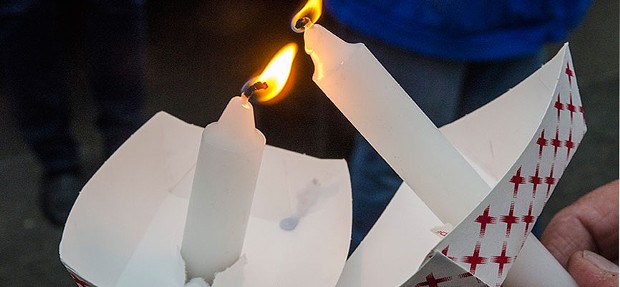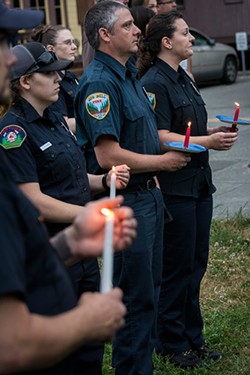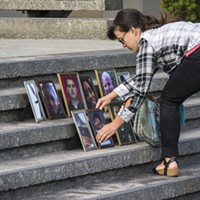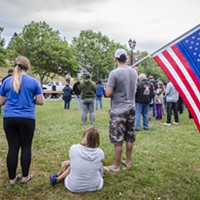Humboldt Responds
Readers begin a dialogue on race, policing and the deadly toll of a tragic week
By Thadeus Greenson [email protected] @ThadeusGreenson[
{
"name": "Top Stories Video Pair",
"insertPoint": "7",
"component": "17087298",
"parentWrapperClass": "fdn-ads-inline-content-block",
"requiredCountToDisplay": "1"
}
]
We on the North Coast watched intently, tied to our televisions, radios and news feeds this week as more painful stitches were added to the fabric of this nation's history. We watched as parallel tragedies unfolded in Minnesota and Louisiana, where black men were killed by police bullets, adding fresh urgency to the steady boil of the Black Lives Matter movement. Then, we looked on dumbstruck as a sniper's bullets killed five Dallas police officers who'd been watching over an otherwise peaceful protest. Demonstrations, vigils and acts of civil disobedience followed in communities across the nation, including our own.
These events were instantly added to the complex tangle of this nation's legacies of institutionalized classism, racism and gun violence. News of each of the shootings — complete with amateur video footage that found its way to the Internet — has been parsed and filtered, used by many simply to buttress long-held biases and beliefs. What's been largely missing over the past week is an honest and open dialogue about these events and what they mean and how we can learn from them and keep them from repeating over and over and over again.
It's a difficult conversation, to be sure, one that's daunting in its scope and in the need to stray from worn paradigms of good and evil, black and white, justified and criminal. It's a conversation that seemingly has no bounds: set against the backdrop of a nation built on slavery; the reverberating impacts of a failed war on drugs that has criminalized addicts, turned neighborhoods into war zones and led to generational animosity between police and portions of the communities they serve; the troubling escalation of all forms of gun violence in this country (as of press time, the country had seen 28,063 separate incidents so far this year, according to the nonprofit Gun Violence Archive); and ongoing mental health and addiction crises playing out in slow motion in communities throughout the nation to devastating consequences.
Again, it's daunting, and it's difficult to know where to start. But, as a reporter, I do see some desperately needed first steps. We need better data to track these fatal altercations so we can sort them out and analyze them to better understand how they happen and who they happen to. We need police agencies as a whole to be more transparent, to have the courage to openly discuss these incidents and how they could have been handled differently, to treat them as painful opportunities for growth rather than simply as exposures to liability. And we as citizens need to understand that we are placing an ever growing burden on our officers, asking them to double as mental health clinicians and social workers, and recognize that humans are fallible and mistakes will be made.
And most of all, we need to listen to each other, understanding that our futures are intrinsically tied. If we're going to loosen the tangle in which history has left us, we must do it together: honestly, thoughtfully and with optimism.
In that vein, we asked you readers to weigh in on the issue. We wanted to hear your frustration, grief, support and solutions in order to start a local dialogue. Here's what you told us.
Flashbacks
It has been a very depressing week that has taken me back to the 1960s. Race riots, cities burning, assassinations of President Kennedy, Malcolm X, Martin Luther King, Bobby Kennedy and, in 1970, the Kent State shootings. I started paying attention to politics in 1960 with Kennedy and I have never seen an uglier, more childish primary year than this one. And it is the campaigning on one side that has brought out much of the anger, racism, hatred and ugliness we are seeing now.
The most recent killings of black men by police should never have happened. And the shooting of the Dallas police never should have happened. Hatred leads to more hatred. But to watch videos of cops on top of a man who is face down on the ground shooting that man, and of a cop shooting a man four times while he sits in his car, just left me devastated.
There is a need for much better training of police officers in the use of weapons and their conduct. A man is dead because he had a broken taillight. Why didn't the cop just pull him over and ask him if he knew his taillight was broken and urge him to get it fixed? Individuals do things that sometimes cast very dark shadows on all of their colleagues. And members of the Dallas police force paid for it.
None of this was necessary. None of it.
Dave Rosso, Eureka
Deeper Problems
The Dallas murders remind me of the dangers that police officers face every day, even here in Humboldt County. They never know when someone they've pulled over is going to try to shoot them, stab them or run them over. A California Highway Patrol officer was nearly killed a while back by a young man in Hoopa who the officer was trying to assist. Officers working for the district attorney were recently shot at in Eureka by someone they were trying to interview for a case.
Local officers get paid significantly less than those in most California cities and counties, so I'm doubly grateful that these men and women are willing to take on the dangerous, difficult work of protecting me, my family, my neighbors and my community.
I also support the Black Lives Matter movement, and its demands that police agencies and individual officers dig deeper into their biases and commit to treating people fairly and equally. As Eureka Police Chief Andy Mills stated in an editorial last week, Black Lives Matter is a response to the experiences of "prejudice and abuse" of people of color.
Sometimes it's hard to reconcile these perspectives. The actions of the Dallas killer support the views of people who says there's a war going on between black Americans and the police.
We can't succumb to that thinking. As President Obama said last week, "The vast majority of police officers are doing a really good job and are trying to protect people and do so fairly." It's also important to remember what Obama said in an earlier speech on police killings. In poor communities, police officers are tasked with the impossible: protecting people in neighborhoods decimated by poverty, hopelessness and violence.
Those deeper problems must be solved, and that's a job for more than the police.
Jim Hight, Eureka
When Will it Stop?
As long as the powers in D.C. continue to be ruled by the gun lobby and the ultra rich, there will be nothing done. They can't even eliminate people on the no-fly list from buying assault weapons. Nobody should be able to buy a gun without a full check of their records.
Many years ago our then governor, Ronald Reagan, slashed funding for mental health. So now we have crazy people running around buying guns and killing people. After the killing of officers in Dallas, I can understand why the police are afraid. I just wish they would shoot to injure rather than shooting somebody several times if they are black and carrying a stick or a knife. They need better training. There are many outstanding police personnel but the only ones we hear about are the bad ones.
The Dallas killer had a huge aresenal. How do we stop that?
People are fed up with the job that our legislators are doing as they spend most of their time fundraising. When will the killing stop? When will we spend some money helping out people with mental problems?
Robert Thoman, McKinleyville
Weed them Out
Police are not policing their own, therefore, jeopardizing the good cops. Get rid of bad cops. ... Stop giving them "leave with pay" and make sure they are prosecuted quickly.
Ellen Bryant, Eureka
A Long Road
How have we gotten here? How do we live in a time where a man can be shot at a traffic stop, while his girlfriend and her 4-year-old child sit in the car? How do we live in a world stewing with so much hatred a man will open fire on anyone, citing his need for violence? How has violence become the only tool for humans to voice themselves?
These events are tragic, but are a common thread in the story of America. We mustn't forget that the Civil Rights Movement gained momentum when America saw the lynching of Emmett Till in 1955, when Rodney King faced violent brutality from the hands of law enforcement in 1991, or when an innocent teenager, Eugene Williams, was drowned for swimming in 1919, and the list, upsettingly, goes on.
The power of these events is when humanity comes together to seek fundamental understanding, stand in solidarity, and incite change through dialogue and policy. This cannot be a common thread of history for much longer. We cannot keep losing members of our global family. The wounds of war run deep, and it's sad we have to keep fighting for survival, but we mustn't give up.
Everyone is a part of this; everyone has a part in this. We have a long road ahead, but humanity is tuning in and defining its voice. Among all this fighting between parties, movements, ideologies, don't forget to listen. The human struggle from oppression is calling our names and we have the power to change the world as we see fit. When we listen to people of the world and their stories of oppression, we can start to change the ailments of our society. When we listen to each other, we change our perceptions of the world.
Elizabeth Phillips, Eureka
Shame on You
I'm so angry. Another unarmed black man killed by police officers.
To my white brothers and sisters (I'm half-white, half brown, but blend well in white society), who refuse to see the pain, to acknowledge the racist history that created this country, who refuse to believe, who do not try to empathize, who continue to ignore police brutality when video clearly confirms what voices from communities of color have been saying for generations: Shame on you! And to those who do have an understanding and yet say nothing, shame on you, too!
To the deniers of reality, you cause me to feel shame about my race; not guilt, because I don't stand by and let it happen — the joke, the comment, the racist action. I say something, so shame is what you make me feel.
My white uncle was a police officer for 25 years and never shot a human being, even when he worked in a predominantly black neighborhood. Of course, not all police officers are bad, but that does not mean police brutality does not exist. Nor does it negate the outrage when officers are killed by snipers.
Why is it easy for me to empathize? I am an informed woman ... I have a fear in and outside of my home for myself and daughter, of being raped; I witnessed how my brown father was treated by those in authority, how teachers have treated my friends of color, and I know U.S. history ... police brutality has been a problem for a very long time.
So, when the majority stays silent, leaving it to only those who are oppressed to voice their outrage, you perpetuate the problem as equally as those who deny it exists. Stand up and use your white privilege by being an ally. Work on your — our — community for a change.
AJ Atienza, Arcata
Together we are Greater
Despite what some may claim as they seek to unfairly paint all cops as callous racists and murderers, I firmly believe the vast majority of law enforcement officers are caring professionals who stand ready and willing to risk their lives for others regardless of race, color or religion. This truth was immortally demonstrated by the brave Dallas officers who ran toward the sound of gunfire on July 7 and selflessly placed themselves between the gunman and civilians, even as the bodies of their fallen brothers lay in the street.
Black lives matter but "Blue" lives matter, too. All lives matter. The tremendous support we have been shown by so many in our community has been heartening and is deeply appreciated. I attended the candlelight vigil at Rohner Park in Fortuna on Friday night where, with little advance notice, nearly 200 people gathered to remember our fallen heroes in Dallas.
As we stood there together, a community united, I reflected upon how it is in the darkest moments like these that the light of courage, honor and sacrifice burns most fiercely. But I was also reminded that this light must be safeguarded from dark winds of hatred and hostility, just as we each carefully shielded the candles we held in our hands from the evening breeze. Hate extinguishes hope. As a community and a nation, we cannot surrender to fear, propaganda or animosity.
There can be no "them vs. us" as we serve and protect a public that needs us. We also need you. Together we are greater than these tragedies. And if we truly believe that Black Lives Matter and Blue Lives Matter and All Lives Matter, it is our solemn responsibility as a nation to prove it by recognizing inequity, abhorring reprehensible violence and bringing it to an end.
Steve Watson, Eureka police captain
They're Winning
The one-percenters are winning. Media are all asking why these tragedies are happening. But it's not a mystery. The oligarchy has been using race baiting as a fear mongering tactic for a long time. Our prisons are packed with the results. Blame-the-victim works and keeps the attention away from where it belongs. Our economy and our government are owned by a tiny handful of people with vast resources.
The working and lower-middle classes are being squeezed to the wall by an economy that long ago left them behind, and the messages from leadership and the media are clear about who's to blame. Trump says build a wall and keep those Mexicans out and the idiots cheer. So people of color are being killed by police and imprisoned at hugely inequitable rates. And — pay attention Chief Mills — those police are walking free and that sends a message to other police and to people of color, and the anger mounts and mounts. And those police don't even know that they're flunkies.
Everyone's surprised by Dallas. What surprises me is that it didn't happen sooner. But now the lid's off Pandoras' box and it will happen again. I wouldn't want to be at the funeral procession in Dallas, it could be a moving target.
The puppet masters in charge are pulling the strings and the politically, historically ignorant public is blindly doing their biddings. Progressives must work at educational outreach, at opening eyes, or nothing will change. Nothing is more important than creating an aware, educated citizenry that can look to where the real power brokers are and hold them accountable.
Sylvia De Rooy, Eureka
A Critical Role
The murder of police offers in Dallas and the senseless killing of a young African American man in Minnesota are the latest in the long list of tragedies that have left a deep wound on our collective spirit. After each tragedy we ask, why? Why did the police officer kill an unarmed person? What would motivate a young man to walk into a church and murder people at prayer? Why did a U.S. Army veteran who served his country murder five police officers?
We cannot help but be emotionally overwhelmed by each and every tragic and senseless event that results in the loss of innocent lives. It is good and healthy to demand answers as to why the things happen. It's also good to demand solutions and change. We should expect more of ourselves as human beings and we must demand that our leaders work together to find answers. However, the answers will be slow in coming and our political leaders appear to be mired in political maneuvering and blaming. That said, we must not allow ourselves to become lost in despair and desperation.
We cannot lose hope. We cannot give up. Instead, we must honor the lives that have been lost by renewing our individual commitment to developing meaningful ways to confront the real problems that threaten the well-being of our fellow Americans and the health of our nation. We must listen to one another with patience and a genuine desire to understand. We must speak out against violence, racism and hatred. We must learn about the lives of others. We must act in ways that promote peace and compassion for all people.
We cannot wait for everyone else to agree to do these things before we begin to do them ourselves. Each one of us must commit to doing these things now, today, tomorrow, and during all the days that follow. College of the Redwoods takes this responsibility very seriously.
We believe our students play a critical role in addressing the serious problems we face, and we will intensify our dedication to helping them develop the skills and values necessary for this important task. The board of trustees, administration, faculty and staff firmly believe that our students truly are our future. Caring for them is a sacred and solemn responsibility — one that we shoulder with pride and commitment.
Dr. Keith Snow-Flamer, Interim president/superintendent, College of the Redwoods
Dr. Angelina Hill, interim vice president of instruction and student development, College of the Redwoods
Reduce the Rhetoric
Cops come in all sizes, levels, conditions and colors. Each brings skill sets to their job and none are Ninja fighters. Understand that mental health conditions, alcohol abuse and drug intoxication can alter police contacts as intoxicated people behave in ways they normally would not. As a young cop, I fought with men half my weight, yet it took four cops to pin them to the ground where they became susceptible to death by excited delirium. Throw a weapon in the mix, the incident gets a lot more complicated and dangerous for all.
Society asks young cops to intervene daily into volatile situations that are beyond the control of the public. I will not ask them to take unreasonable risk because someone decided to get wasted and put others at risk while armed. We ask officers to risk themselves in order to deescalate problems, and most often they are successful. Yet 990 people lost their lives last year while interacting with the police. The questions are why and how do we fix this? An objective look at data is necessary.
As a culture we need to look at data and reduce rhetoric. National Review posted an article on police shootings data. There is also a recent book published on a similar topic: In Context, Understanding Police Killings of Unarmed Civilians, which reviews 153 cases from 2015.
Here is where we should focus: Examine in detail police use of force data; have genuine discussions about race, imprisonment, justice and poverty; reform police leadership to be more transparent, including the release of video; open police files to oversight, even personnel files when legally permissible; encourage all police agencies to learn and practice de-escalation techniques; have a sincere discussion about mental health problems and the lack of resources, a topic for both presidential candidates.
Andrew Mills, Eureka chief of police
more from the author
-
Deputy Shoots Cutten Shooting Suspect
- Apr 25, 2024
-
Officials Weigh in on SCOTUS Case's Local Implications
- Apr 25, 2024
-
Arcata Lowers Earth Flag as Initiative Proponents Promise Appeal
- Apr 25, 2024
- More »
Latest in News
Readers also liked…
-
Through Mark Larson's Lens
A local photographer's favorite images of 2022 in Humboldt
- Jan 5, 2023
-
'To Celebrate Our Sovereignty'
Yurok Tribe to host gathering honoring 'ultimate river warrior' on the anniversary of the U.S. Supreme Court ruling that changed everything
- Jun 8, 2023



































